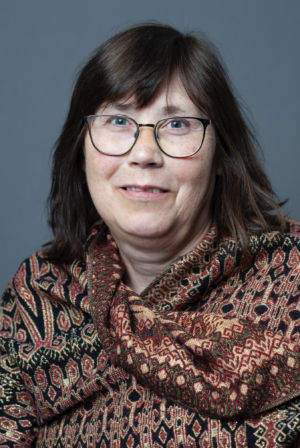
![]()
3pm GMT Friday 19th February
CENL is pleased to partner with NAPLE to co-host the upcoming webinar on the role of national and public libraries in engaging users of regional and minority languages.
A vast majority of countries in Europe have signed the European Charter for Regional or Minority Languages. Signatory members also acknowledge the importance for all European countries to protect the diversity of languages and cultural heritage that regional or minority languages represent. The right to non-discrimination is important, but not as strong as a system of positive protection the Charter enforces.
Libraries have an immensely important role to play in keeping these languages alive, but also to revitalise and develop the languages in an everyday context; to bridge generations and to facilitate the transfer of a language that is fragile, either in that particular area or as a small language, where the total number of speakers are low.
Examples of the different situations are illustrated by cases from three countries. Due to the history of Russian suppression, though the Estonian language is the official native tongue of Estonia, it is still a relatively small language. From Slovenia, we will learn about the important work to preserve Italian language in the area of Koper-Capodistria close to the Italian border. Our third case study is from Sweden, where the government appointed the National Library of Sweden a commission to reinforce and develop services for national minorities and the indigenous Sami people.
Join us at 3pm GMT on Friday 19th February. The event is free, sign-up below.
Registration Link (Eventbrite):
Speakers
Aleksandro Burra, Central Library Koper-Capodistria, Slovenia
“The role of public libraries in helping children improve minority language: the case of Slovene Istria”
Kristel Palk, Tallinn Central Library, Estonia
“No language is an island entire of itself: Supporting language learning in a public library”
Elisabet Rundqvist, National Library of Sweden
“Bridging past to future. Why national libraries matters for the survival of small languages”
Chair
The event will be chaired by Stuart Hamilton, Head of Libraries Development for the Local Government Management Agency (LGMA) in Ireland, and NAPLE President.
Stuart Hamilton is the Head of Libraries Development for the Local Government Management Agency (LGMA) in Ireland. He is the national advisor on libraries in the local government sector and leads the strategic development and implementation of service innovation and change management.

He was previously Deputy Executive Director of International Relations and Communications at the Qatar National Library where he developed the library’s international relations, partnerships and outreach activities, and led the coordination of the library’s opening in 2017/2018.
Before moving to Qatar he was Deputy Secretary General at the International Federation of Library Associations and Institutions (IFLA) in the Netherlands where he directed IFLA’s policy and advocacy work around copyright, human rights, Internet governance, and all issues relating to access to information, libraries and the digital environment. He is the current President of the National Authorities on Public Libraries in Europe (NAPLE) Forum.
Aleksandro Burra is from Koper-Capodistria in Slovenia and his studies and work has focused on preserving minority culture and language. His goals are to preserve and promote the rich material and immaterial cultural heritage of Koper-Capodistria through working with schools and the youth population, as well as through available ICT tools.

Aleksandro has a PHD in International Sociology with a focus on transborder policies from the University of Trieste. His thesis, titled “The role of minorities in the future Euroregion in the upper Adriatic: the case of Italian minority in Slovenia and Croatia”, explored the efforts of minorities to preserve their cultural and linguistic histories in this region.
After working as a Librarian and History Teacher at Pietro Coppo, an Italian language minority school in Izola-Isola, Aleksandro was a Pedagogical Consultant for Slovenia’s National Education Institute, where he helped evaluate and develop best practices and professional development programs for teachers in Italian language schools. In 2019, he joined Koper-Capodistria’s Central Library as a Librarian in their Local Studies department, where he has helped organise events to promote local knowledge and traditions and foster a learning culture.
Kristel Palk is Head of the Department of Literature in Foreign Languages at Tallinn Central Library, Estonia.

Kristel has worked as a librarian in Tallinn Central Library for twelve years. Since 2014, she has held the position of the Head of the Department of Literature in Foreign Languages at Tallinn Central Library. Prior to which, she had worked as a librarian in the Library’s branch libraries from 2009-2011, and was the head of branch library in Tallinn Central Library from 2011-2013.
Kristel studied Sociology and Social and Cultural Anthropology (BA) in Tallinn University. She was nominated for the 2016 Charlemagne Youth Prize.
Elisabet Rundqvist is an Executive Officer at the National Library of Sweden, and a standing committee member of the IFLA Indigenous Matters Section.

In 2003, Elisabet graduated from Uppsala University with a Master’s degree in Library and Information Science and started working as a librarian at the National Library the same year.
Since 2007, Elisabet holds a position as an executive officer at the National coordination of libraries, as a specialist of the Swedish Library Act and public libraries. Elisabet is also a special adviser within the field of libraries and national minorities and the Sami indigenous people.
Since 2013, Elisabet has grown a great understanding of the challenges the public libraries face in developing library services for national minorities and the Sami population. After a long-term preparatory work to raise awareness and build structures for strengthened library services directed towards national minorities, the government appointed the National Library of Sweden a commission to reinforce and develop services at four special libraries, for the Sami, Finnish, Yiddish and Tornedal population.